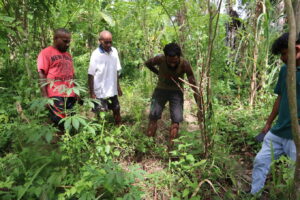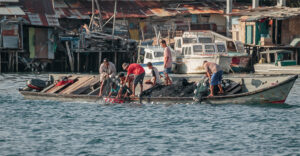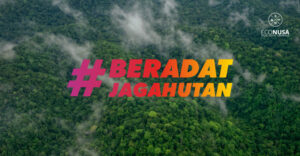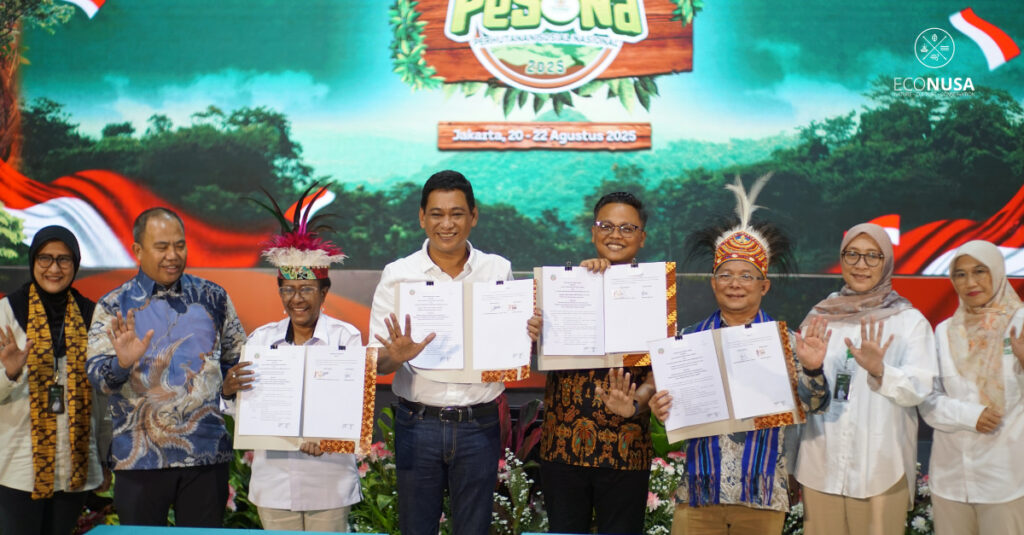
EcoNusa Foundation signed a cooperation agreement with the Ambon Social Forestry Office (BPS Ambon) and the Manokwari Social Forestry Office (BPS Manokwari) on Wednesday, August 20, 2025. This collaboration focuses on accelerating and strengthening the implementation of social forestry management within the working areas of the two offices, which cover almost all of the Maluku Islands and Tanah Papua. The agreement marks an important milestone in supporting social forestry programs that place local communities as the main actors in forest management.
The partnership between EcoNusa and the two offices is designed to strengthen Indigenous and local communities living around forests in various aspects: ranging from assistance with management permit applications, area development, institution building, to productive enterprises. It also includes mapping customary territories, addressing land tenure conflicts, documenting local wisdom, and building community capacity through training and mentoring.
Read also: Meeting with DPD Committee II, Communities Hope for Recognition of Customary Forests
Bustar Maitar, CEO of EcoNusa Foundation, emphasized that supporting Indigenous peoples is at the heart of this collaboration. EcoNusa is committed to helping Indigenous communities in the process of mapping their territories so that they can be recognized by the state as customary forests. “We believe that the rights of Indigenous peoples must be fulfilled. Through mapping support and applications for customary forests, they not only gain legal access but can also manage the forests independently. Moreover, we want communities to benefit economically from forests they have cared for across generations,” said Bustar.
Susan Trida Salosa, Head of BPS Manokwari, viewed this partnership as a continuation of initiatives already underway. EcoNusa has assisted several communities in mapping customary territories and empowering local economies, and this collaboration extends that work, especially in the economic domain. “Communities already have products and commodities. Unfortunately, marketing remains a weak point. This is where EcoNusa can play a role as an off-taker to help distribute community products. That way, added value can be enjoyed directly by forest farmer groups,” she said.
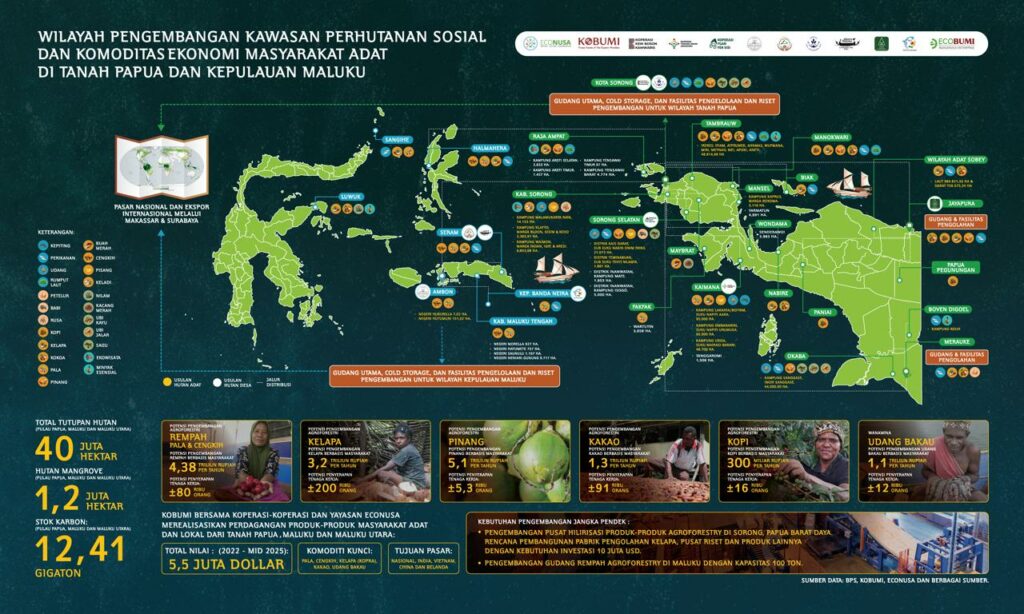
Meanwhile, Ojom Somantri, Head of BPS Ambon, stressed that social forestry is very different from corporate forest management. Companies are capital-intensive and supported by professional human resources, while communities rely on collective work with limited capital. “That is why they need partners like EcoNusa, who can provide business assistance, open market access, and strengthen capacity. Our hope is that the mandate of Presidential Regulation No. 28 on Integrated Acceleration of Social Forestry can be realized. The ultimate goal is clear: prosperous communities and sustainable forests,” he explained.
Ojom also highlighted the enormous potential of non-timber forest products (NTFPs) in Maluku, North Maluku, and Southwest Papua, such as nutmeg, cloves, patchouli, and damar. He expressed hope that these commodities could become high-value flagship products if well processed. In addition, ecosystem services such as clean water supply could be developed into community enterprises. “When communities protect the forest, water continues to flow, and from that, economic opportunities can be developed,” Ojom added.
Read also: A Travel Note: Legal Training to Promote Women’s Participation in Papua
The Ambon Social Forestry Office oversees four provinces: Maluku, North Maluku, West Papua, and Papua. The Manokwari Office covers five provinces: West Papua, Papua, Central Papua, Highland Papua, and South Papua. The vast regions, with their ecological diversity and Indigenous cultures, make social forestry in these areas both a challenge and a major opportunity.
This collaboration is expected to open greater opportunities for Indigenous and local communities in Maluku and Papua to truly become the main actors in forest management. With mentoring and marketing support, non-timber forest products can be better processed, added value can return to the communities, and forests can be safeguarded from destructive exploitation.
At the national level, the social forestry program has been running for 35 years. To date, the government has granted management access to 8.32 million hectares of land to communities, covering 11,065 decrees. More than 1.4 million households have benefited, and 15,754 Social Forestry Business Groups (KUPS) have been established. From January to August 2025 alone, the program generated IDR 417 billion in economic value, though the 2025 target is set at IDR 1.5 trillion. These figures show that there is still significant room to strengthen capacity, develop enterprises, and expand market access for communities.


